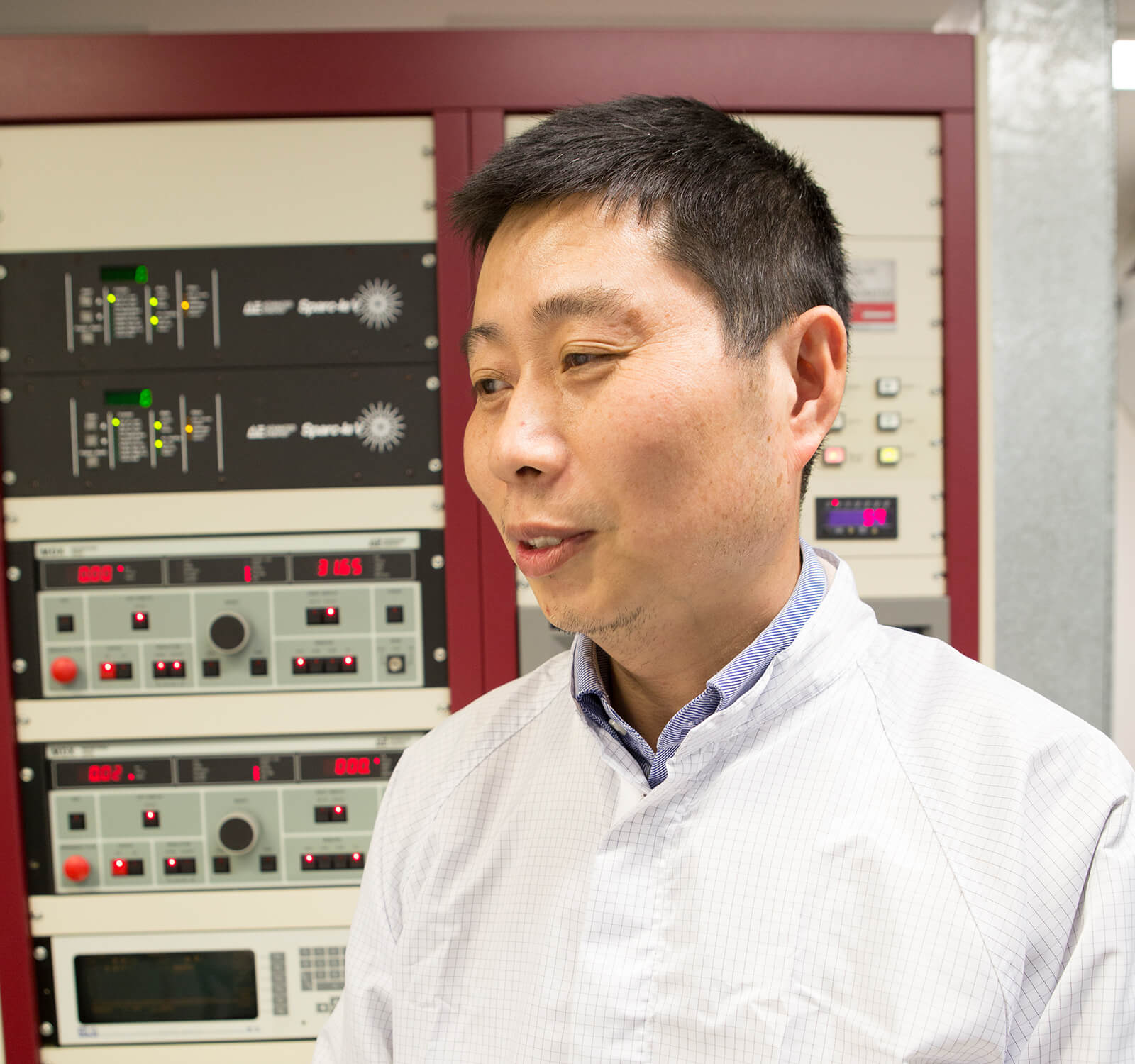COMPUTING SCIENCE - MPHIL/PHD
Qualification: Master of Philosophy (MPhil)/Doctor of Philosophy degree (PhD) in Computing Science
School: School of Computing, Engineering & Physical Sciences
Campus(es): Paisley, Lanarkshire and London
Start date: October, February, April, or June
Admissions Deadline: September, January, March, or May
Duration: MPhil - Minimum of 24 months full-time or 48 months part-time/PhD - Minimum of 36 months full-time or 72 months part-time
Fees: Tuition Fees for Research Degrees

PHD STUDENTSHIPS 2024
University of the West of Scotland currently has a mixture of some 34 PhD projects, programmes and studentships available for start in October 2024.
This comprises 21 PhD programmes of research which are fully-funded (Vice-Chancellor Studentships 2024) for eligible applicants and 13 PhD programmes of research for self-funding applicants.
You can also propose your own PhD research topic. Contact the academic lead (on this page) to discuss your proposal.
Computer Science Research
UWS has a long and distinguished history in teaching computing science, starting in the late 1960s. As the discipline has evolved, UWS has been at the forefront of this emerging science, teaching generations of IT professionals and influencing the discipline with its dedicated applied research activities.
The School of Computing, Engineering and Physical Science’s research activities in the domain of Computing Science centre around the research activities and output of the Institute of Artificial Intelligence, Virtual Communications and Networks (AVCN); one of the strongest UWS research units in terms of research outputs, intellectual property (IP), and income generation.
Current Research Themes & Areas of Expertise
The Division of Computing, through AVCN has established expertise with significant research outcomes in the following areas:
- Applied Artificial Intelligence (AI)
- Machine/Deep Learning
- Big data & Data Analytics
- 5G and Beyond Networks
- IoTs, Sensor Network, Cloud Computing
- Blockchain Technology
- Video & Image Compression & Transmission
- Cyber and Network Security
- Intelligent Decision Support Systems
- Scheduling, Optimization & Logistics Management
- Connected and Remote Healthcare
- Public Safety and Security
- SMART Environment
- Autonomous Systems
- Virtual Reality, Extended Reality, Mixed Reality
We welcome applications from anyone whose research ambitions links, however broadly, with these areas, and members of the team are happy to discuss the possibility of developing studentship and funding applications.
Current Research Projects
The School has a number of defined research projects for the coming session in the domain of Computing Science which are available to self-funded students. Use the key contact details are the bottom of the page to get in touch to discuss this in more detail. Or contact CEPS-Research@uws.ac.uk.
UNITED NATIONS SUSTAINABLE DEVELOPMENT GOALS (SDGS)
The study of computing science (in all its many forms) concerns all walks of life, sectors, and can provide a remedy to several societal challenges as alluded to in the UN SDGs. Our current research activities directly map to 9 UN SDGs:
SDG 3 - Good Health & Wellbeing; SDG 4 - Quality Education; SDG 9 - Industry, Innovation and Infrastructure; SDG 10 - Reduced Inequalities; SDG 11 - Sustainable Cities and Communities; SDG 12 - Responsible Consumption and Production; SDG 13 - Climate Action; SDG 14 - Life Below Water; SDG 15 - Life on Land.
UWS aims to be among the global leaders of excellent, relevant and purposeful research aligned with the United Nations SDGs by placing them at the heart of our Strategy 2025.
In the Times Higher Education Impact Rankings 2022, UWS was the most impactful university in Scotland for 'decent work and economic growth' (United Nations Sustainable Development Goal 8), and 23rd most impactful university in the world for 'reducing inequalities' (UN Sustainable Development Goal 10).
INSTITUTE OF ARTIFICIAL INTELLIGENCE, VIRTUAL COMMUNICATIONS AND NETWORKS (AVCN)
Over the past decade, AVCN developed a strong track record in areas such as Artificial Intelligence (AI), Extended Realities, 5G+ Networks, Big Data, Deep Learning, IoT, Blockchain, Autonomous Systems and Cyber Security, winning prestigious awards, generating research impact and IP, and securing significant grants from national and international funding agencies and industries.
The AVCN research institute mission is to develop disruptive technologies that impact positively on all areas of society (including health, education, industry, and inclusion), foster collaboration, sustainability, and contribute to achieving the UN SDG goals.
INSTITUTE OF ARTICIFICIAL INTELLIGENCE, VIRTUAL COMMUNICATIONS AND NETWORKS
AVCN has a nested structure of different Research Groups that address key areas for achieving its mission:
Beyond 5G Research Group
Working at the forefront of research in the EU and the UK, conducting cutting-edge R&D projects, developing and bringing to society the next generation network, connecting people across the world and reducing inequality.
MORE ON BEYOND 5G
Affective and Human Computing for Smart Environments Research Group
Embrace a multidisciplinary approach to develop Affective and Human Computing for Smart Spaces. Its mission is to create technologies that make environments more responsive to human needs and emotions, fostering quality of living and wellbeing through technology.
AFFECTIVE AND HUMAN COMPUTING FOR SMART ENVIRONMENTS RESEARCH GROUP
Advanced Laboratory for Autonomous Intelligent Systems Research Group
This group is actively working to develop the industry infrastructure for intelligent robotic vision systems for the next generation of autonomous uncrewed air/land/sea vehicle swarms. The group is advancing UN SDGs related to climate action, sustainable cities, secure transport systems, energy, life on land and below water, and clean energy.
UWS Creative Computing Technologies Research Group
Focuses on innovative and sustainable technical applications of creative computing technologies to industrial and societal issues aiming to better education, industry infrastructures, inclusion, well-being, and quality of living.
CREATIVE COMPUTING TECHNOLOGY
Data Analytics for Intelligent and Autonomous Systems Research Group
This group focuses on addresses challenges of data collection from diverse sources, developing actionable insight using complex and scarce data, and performing trustworthy analytics as well as new developments in the areas of end-to-end data analytics.
DATA ANALYTICS FOR INTELLIGENT AND AUTONOMOUS SYSTEMS RESEARCH GROUP
Entry Requirements
MRes / MPhil / MPhil-PhD
The minimum requirements for an applicant for registration for the degree of MRes or MPhil or for the degree of MRes/MPhil with the intention of transfer to PhD shall be a first or second class honours degree from a university in the United Kingdom, or of an equivalent qualification.
Applicants holding qualifications other than those specified above shall be considered on their merits and in relation to the nature and scope of the programme of work planned.
PhD - direct application
Direct registration for the degree of PhD may also be approved, at the discretion of the University if the applicant holds an MRes/MPhil degree of a United Kingdom University, or an MRes/MPhil degree of equivalent standard of a non-UK University, provided that the MRes/MPhil degree is in a subject area which is appropriate to the proposed programme of work.
Exceptionally, direct registration for the degree of PhD may also be approved, at the discretion of the University, even if the applicant is not the holder of an MRes/MPhil degree, but does hold an exceptionally high-quality honours degree or taught master’s degree (or equivalent) in an appropriate discipline, AND has appropriate research experience at postgraduate level which has resulted in significant peer-reviewed publications, and where verifiable evidence of accomplishment is supplied.
English Language Requirements
For applicants whose first language is not English, the University sets a minimum English Language proficiency level. The qualifications below must have been gained within two years of the start of your course.
General English language requirements at UWS: International English Language Testing System (IELTS) Academic module (not General Training)
For our research degrees (MRes, MPhil, PhD, DBA, DProf), applicants are required to have an IELTS score as follows:
- Overall score of 6.5
- No sub-test less than 6.0
MORE ON ENGLISH LANGUAGE REQUIREMENTS
HOW TO APPLY
Applying for postgraduate research study at UWS has never been simpler. Click the link below to find more information about:
- Postgraduate Research step-by-step guide - everything you need to know to submit a successful application.
- Link to our online application system.
MORE ABOUT APPLYING FOR RESEARCH DEGREES
